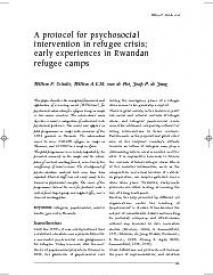A protocol for psychosocial intervention in refugee crisis; early experiences in Rwandan refugee camps
This paper describes the conceptual framework and application of a working model (‘EPSoCare) for psychosocial interventionfor refugees living in camps in low income countries. The intervention's main objective is social re-integration of individuals with psychosocial problems. The model was applied in pilot programmes in camps with survivors of the 1994 genocide in Rwanda. The interventions aimed to cover 360.000 refugees in camps in Tanzania, and 230.000 in a camp in Zaire. The pilot programmes were heavily impacted by the prevalent insecurity in the camps and the atmosphere of mistrust resultingfrom it, as well as by the insufficiency of social services. The development of psycho-education material took more time than expected. Medical staf was not easily ready to be trained in psychosocial concepts. The course of the programmes showed the need for protocols with a well-defined target group and support offer, and a clear-cut working plan. Keywords: refugees, psychosocial, mental health, genocide, Rwanda
Geachte bezoeker,
De informatie die u nu opvraagt, kan door psychotraumanet niet aan u worden getoond. Dit kan verschillende redenen hebben,
waarvan (bescherming van het) auteursrecht de meeste voorkomende is. Wanneer het mogelijk is om u door te verwijzen naar de bron
van deze informatie, dan ziet u hier onder een link naar die plek.
Als er geen link staat, kunt u contact opnemen met de bibliotheek,
die u verder op weg kan helpen.
Met vriendelijke groet,
Het psychotraumanet-team.
Reference:
Willem F. Scholte, Willem A.C.M. van de Put, Joop P. de Jong | 2004
In: Intervention: the international journal of mental health, psychosocial work and counselling in areas of armed conflict, ISSN 1571-8883 | 2 | 3 | 181-192
http://www.interventionjournal.com/sites/default/files/181_192_scholte.pdf
In: Intervention: the international journal of mental health, psychosocial work and counselling in areas of armed conflict, ISSN 1571-8883 | 2 | 3 | 181-192
http://www.interventionjournal.com/sites/default/files/181_192_scholte.pdf


